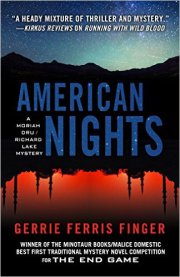
If life's a journey, the writing life is a filled with detours.
When I retired from news writing and embarked on a career as a novelist, I took so many back roads, I can't count them. I was technique-challenged. I knew the basics and the differences between writing novels and newspaper copy. The longer form, whether genre or literary, involves conflict, plot structure, character building, setting, plot and theme. News editors reject all that to crowd as much information into as small a space as possible.
I spent nearly twenty years with The Atlanta-Journal Constitution writing inverted pyramid style hard news, and, sometimes crossing over into softer features and magazine pieces.
· The newspaper reporter lays out facts, the famous "when, where, who" with the climax in the lede. Then the why and the how get into the story, if they are facts. If an investigator gives an opinion on how the crime was accomplished, he is quoted. His words are facts because he said them. A news writer does not let his opinion seep into the story.
· A feature story lays out facts, too, but delves into the how and why, slowly drawing readers into the piece, often captivating them with clever or poignant phrases. Usually, if there is a punch line, it's at the bottom. In this sense, feature and magazine writing are good disciplines for a beginning novelist.
When I wrote my first "southern gothic", changing my writing style presented problems. Of the many precepts, experts insisted that we, "show, don't tell". My agent told me, "You need to describe the air and scenes around the characters while they talk. Give them looks on their faces, gestures, and don't tell me they looked shocked, tell me what shocked looks like." She was right. I had my protagonists speaking like dispassionate news subjects. My agent then slammed my optimism by saying news writers often don't make good novelists.
I went overboard. I had rambling sentences that surpassed purple prose. It was like, Oh boy, I got the green light to indulge in the fine art of beautiful language – something I couldn't do as a news writer. The results were sorry. I wrote flashbacks that confused, heavy-handed imagery, too many metaphors, too much repetition – how else was I going to get to eighty thousand words? - and that dreaded of all, detailed back story.
I had characters on top of characters – a sheriff, a city cop, a state bureau of investigation guy. My agent told me I was going to lose my readers if I didn't designate one investigator to represent them all. Heck, when I was writing copy for the paper, the more investigators I interviewed the better. But I was beginning to get it and wrote another book, this time a romantic suspense. Not that it was the genre's fault I overwrote.
As far back as I can remember, I read any type of book that came to hand, but by mid-teens I preferred crime fiction, I had a good idea of building conflict by writing individual scenes, and I knew the importance of ending a chapter with dramatic expectation of what lay ahead.
I had more to learn. After toning down and tightening the prose, I realized that Voice was key for me. Two books later, my voice was still newspaper flat. Agents and publishers are voice hounds; they hear it in the first couple of pages. So do readers. I worked on my voice and style by using the narrative to pace the story. I peopled my work with fewer characters which enhanced the conflicts. THE END GAME was the first novel where I deliberately changed my voice to that of my characters.
My heroine, Moriah Dru, a former policewoman, has a tough job as a child finder. I met tough women at the newspaper. The ones I liked had a soft side. Dru was going to have a iron-willed exterior but a soft middle. I heard her voice in my head before I wrote the first word of her story.
On the other hand, if I were to write a cozy mystery, I would have fun with it. I would hear the voice of my heroine and write her thoughts as fast as my fingers could get them out. One thing for sure, if I can't create an emotional connection with the reader, that reader is lost to me.
There is, however, a similarity between newspaper and book writing that includes journalism's "W's". Readers must be constantly curious. They can't be wondering, what's going on, where's the action? In newspapers, the action starts at the top, in novels the action must exist throughout. Fortunately for the novelist, the action doesn't have to be driven by factual events. We get to make them up. That's the best part.
Last, but not least, I do one or two revisions where I squeeze sentences like I did with my news copy. Active voice takes fewer words, and yanking most adverbs and adjectives make the story sing along quite smoothly.
Gerrie Ferris Finger
This essay first appeared on Cassy Pickard's blog




